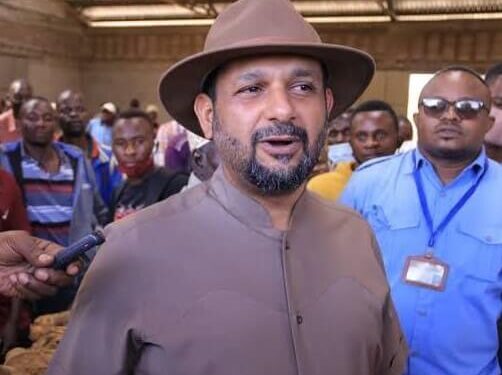A foreign tobacco buying firm operating under the business name of ‘Mkwawa Leaf Tobacco Limited’ has announced strategies that will help to relieve the ailing tobacco business as part of its efforts to uplift farmers in the country.
Under its strategic plan, the firm will effectively engage itself right from the in procurement processes of raw tobacco as a way to empower the indigenous farmers from famous growing regions in the country.
The move aligns with government’s agricultural policies backed by the sixth phase government under President Dr. Samia Suluhu Hassan with a view to promote the cash-crop to international markets.
The firm’s Managing Director Ahmed Mansoor Huwel told The Business Wiz (TBW) in an exclusive interview in Dar es Salaam that the company’s efforts seek to revive tobacco production and upgrade its high value to stakeholders at this time of a competitive global trading atmosphere.

“A number of hindrances farmers experience in the country has actually inspired me to invest in tobacco buying as a way to liberate the stagnated local farmers and let them benefit directly,” he said.
Huwel who also owns a company engaged in processing raw tobacco products known as Amy Holdings, promised to start offering better tobacco seeds alongside good fertilizer to local farmers so as to improve agricultural productivity of local communities.
He noted that his company owns a tobacco processing plant in Morogoro which currently seeks increase tobacco production output in the country.
He noted that the Mkwawa Leaf Company plans to register all tobacco farmers in all regions across the country irrespective of the fact that are not recognized by their cooperative unions.
Huwel has already travelled to some tobacco growing regions in the country such as Tabora, Mbeya, Morogoro and Mwanza and engaged with a number of local farmers.
In one of his tours in up-country regions, he met with Mbeya Regional Commissioner Honorable Juma Homera and engaged farmers whereby he assuring them that he had good intentions to revive the ailing tobacco business across the country.
He warned some local farmers who have already entered into agreement with other companies in the country not to terminate their already signed contract agreements.
“It is not good to terminate such agreements. I am aware of this challenges because my company is here to offer a competitive price which would attract many of farmers, “he affirmed.
Available statistics by the Ministry of Agriculture indicates the production of the tobacco crop in Tanzania has been deteriorating down due to lack of strategic investors”.
In Tanzania about eleven regions are growing two different kinds of tobacco crop for industrial processing which are Virginia Flue Cured as well as Dark Fire Cured.
The regions are Tabora, Shinyanga, Singida, Kagera, Geita, Mara, Iringa, Katavi, Kigoma, Ruvuma and Morogoro.
With the exception of Ruvuma Region, which grows Dark Fire Cured tobacco, the rest of the
Regions cultivate Virginia Flue Cured tobacco.
Morogoro region has in recent advanced crop production, and is now growing some Virginia Flue Cured tobacco in areas such as in Kilosa (Kimamba, Msowero and Kidonga) and Ulanga.
Statistics by the National Bureau of Statistic (NBS) shows that, Tobacco is the second largest export crop in Tanzania, representing between 30 percent and 35 percent of national exports each year.
With these statistics however, therefore, local the tobacco cultivation and manufacturing industry remains of vital importance to the national economy.
In Africa, Zimbabwe is the Africa’s largest tobacco producer, which has been attracting international buyers. The size of the tobacco crop increased despite increased fertilizer prices caused by the war in
Ukraine.
According to United Nations-Food and Agricultural Organization (FAO) the largest tobacco company in the world is the China National Tobacco Corporation, with a revenue of US$ 273 billion per annum.
oughly 250 billion cigarettes are sold in the United States each year from China. The global tobacco
market was valued at over $ 912 billion in 2022.







